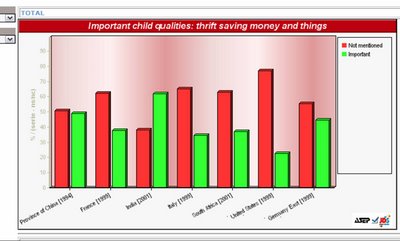One of the question that this space is trying to address (in a very simplistic way I admit )is how different do we feel, perceive or understand the events or people around us. This website, wolrdvaluesurvey.org, tackle this project the most direct way, by asking people all over the world the same questions. I have a weakness for numbers and graphics ( professional habit I guess) so the study really appealed to me . A caveat though, it seems that the sampled populations were a bit smaller than ideal. Still here are a few results to reflect upon:
N.B: The choice of countries by me were arbitrary (my friends here). Madagascar , Zambia and Sri Lanka were not available so South-Africa is in.
Last graphic is Israel and Iran because Lebanon and Palestine were not available.
I have checked the source in depth so if they had an hidden agenda, don't shoot the messenger.
"Province of china" in the study is Taiwan.
South-Africans are the happiest...

India teaches kids to save money early

emphasis on religion with kids is most important in the US

Iran and Israel both emphasize tolerance to their kids similarly so....never mind.

Tags:
human values, culture differences, Taiwan, France, India, Italy, RSA, USA, Germany, tolerance, happiness




awesome! sounds like iran and israel mention tolerance for all except each other
ReplyDeleteyep, the data are a little outdated but it's still pretty informative. One could do a comparison between hot spots: Somalia/ Ethiopia, Israel/neighbours, China/Taiwan, India/Pakistan...
ReplyDeleteHey, this is pretty cool. Do you know anything about their underlying assumptions or how they collected the data? I'm wondering if it's as good as bls.gov which has a lot of worldwide demographics, but I'm not sure it holds this kind of info.
ReplyDeletehey mannmotion,
ReplyDeletehere is one example of how and who made the survey: this is for US in 1990
"Investigators: George Gallup, Alec Gallup and Max Larsen, The Gallup Organization and Ronald Inglehart, University of Michigan
Institute: The Gallup Organization (Princeton)
Date: May-June, 1990
Note:
Sample size: 1839
Field Org.: The Gallup Organization (Princeton)"
This is one of the flaw of the survey but one they cannot go around I guess. The # of people surveyed is 3000 at max. It maybe representative but the margin of error must be quite significant. They also provide global analyses by continent and kind of values.